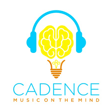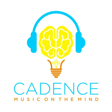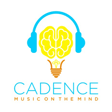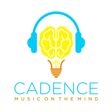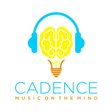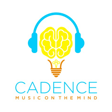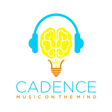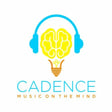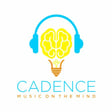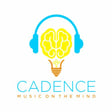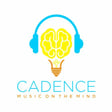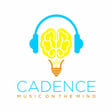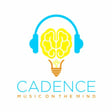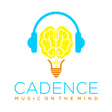Become a Creator today!Start creating today - Share your story with the world!
Start for free
00:00:00
00:00:01

S03 Episode 02: Lullabies and Feelings
Transcript
A Song for My Child: A Parent's Gift
00:00:03
Speaker
I mean, it's actually mind blowing because, you know, I'm an average person just living a normal life and I've got this opportunity to write a song just for my child. It's such a great opportunity and really a once in a lifetime opportunity.
The Power of Music: Uniting and Dividing
00:00:25
Speaker
Welcome back to Cadence, the podcast where we ask what music can tell us about the mind. This season, we're delving into the different ways that music influences us, from the lullabies we heard as babies to the music that helps us choose a president. For better or for worse, music has the power to bring us together, pull us apart, and make us do things we never thought we'd do.
Soothing Through Singing: A Parent's Instinct
00:00:52
Speaker
you
00:00:58
Speaker
There's something instinctual about singing to an infant, even if you're not usually the crooning type. I was never really that into kids and I wondered for a long time if I wanted any of my own. But when I finally had a son, nature kicked in and I found myself discovering all kinds of soothing techniques that I didn't know were effective. Rocking, swaying, shushing, but mostly singing. I'm an opera singer, so the singing itself wasn't new to me, but sometimes it was hard to know what or how to
Lullabies: Easing Stress for Parents and Babies
00:01:26
Speaker
sing to him.
00:01:26
Speaker
I remember one evening when he wouldn't stop crying, and my partner started singing Yellow Submarine, only because it was one of the few songs he knew by heart. That ended up being one of our most frequently used lullabies, and it's still in the rotation, our son is almost six. There's evidence that lullabies aren't just soothing your kids when you sing to them, but that they might also be helping you at the same time, that they might be part of the healing process for caregivers.
Loss, Trauma, and Lullabies: Healing Through Song
00:01:51
Speaker
Choosing to care for a baby is not easy. There's often trauma and loss involved, even if everything is fine. Parents might be losing the potential of a carefree future. There could be physical or psychological pain. You've chosen to care for a new being whose very survival depends on you. And there's research that suggests lullabies can also soothe the mothers who sing them, inducing measurable physiological responses that ease their stress, calm their bodies and their minds.
00:02:18
Speaker
Traditional lullabies with surprisingly dark themes, falling cradles, faces waiting in windows, monstrous alligators, baby-eating crabs, might not have been written to scare kids to sleep, but to help parents process their complex postpartum emotions.
00:02:34
Speaker
In this episode, we'll talk about the role that music plays in the family home, from before a baby's birth to their transition into adulthood.
Music in Family Life: From Prenatal to Adulthood
00:02:42
Speaker
We'll hear from two parents who wrote and recorded a lullaby for their son with the help of a classically trained musician, and from a researcher who studies the impact of music on the relationship between teenagers and their parents. We'll see just how powerful music can be in our family life.
00:03:01
Speaker
Getting pregnant can be a great joy for a woman, or it can be devastating. Pregnancy brings along with it such profound life changes that an unexpected pregnancy can leave a person, especially if they're still a child, with their dreams totally dashed.
00:03:17
Speaker
Turning that bad news into something positive is really hard, and for teen moms, it can be especially difficult to bond with their unborn child, even if they decide to keep it.
The Lullaby Project: Bonding Through Personalized Songs
00:03:28
Speaker
Enter The Lullaby Project. It's run by Carnegie Hall. Tiffany Ortiz is the director of their early childhood programs.
00:03:35
Speaker
The Lullaby Project began in 2011 and it was actually in response to some staff at Jacobi Medical Center who, after seeing some other songwriting projects that we had there, they approached us and said, well, you know, we're working with some pregnant teen mothers and we just wondered what would a music program look like? Could it help them bond with their children? And we said, sure, let's think about that.
00:04:02
Speaker
And so we started to really think about what the role of lullabies would be in families' lives and thought about what it would look like to have a songwriting project centered around writing individualized and personalized lullabies that parents could write for their children.
00:04:19
Speaker
In his book, How Music Works, musician David Burns says music used to be something that people participated in making, but the recording industry made it possible for us to listen to music wherever, whenever, passively. You might have a Spotify account and sing songs sometimes, but how many have you actually tried to write?
00:04:36
Speaker
At the end of the day, we want parents to be able to express their own words, their own love, their own musical ideas in this song. And I think there is a little bit of pressure when you're coming into this experience for the first time to feel like, oh, well, I want it to be good. I'm surrounded by these incredible musicians and
00:04:55
Speaker
Oh, I'm not, you know, a singer by any means. But the fact of the matter is that everyone has inherent musicality. Everyone, even when you see parents talking to their young infants, they're already vocalizing things in a very musical way. And that's something that is so ingrained to us as human beings that, you know, we need to sort of dispel this idea that we're not good enough to be musicians because we all
00:05:22
Speaker
deep down are and have that capacity to express our love for the people around us through music.
Music: A Timeless Human Expression
00:05:29
Speaker
Music plays a primal role in our culture. Our oldest artifacts, some 40,000 years old, include musical instruments made from bones.
00:05:39
Speaker
So for as long as we've been creative, as long as we've been creating art at least, art that leaves a trace, we've been making music. And music is the way in which we learn to speak. When you think about a child who is just starting to babble, what they're understanding are not necessarily the meanings of the words, but the prosody with which they are spoken. Meaning is in the melody of speech.
00:06:02
Speaker
The Lullabye Project has big ambitions.
The Lullaby Project's Community Impact
00:06:05
Speaker
They want to reach out to many new parents struggling with this huge life change and many people in all kinds of situations in which they feel a loss of control and which can be tinged with despair. We continue to work in hospitals and clinics. We also have partnerships with the Department of Homeless Services.
00:06:22
Speaker
Department of Corrections. We've worked in libraries for general families who came in. So really thinking about it from a community approach as well as a social impact approach. It's something that lives with them. It's something that they will use and that can have meaning in their own lives.
00:06:41
Speaker
And to go back a minute, this is happening at Carnegie Hall. The Carnegie Hall.
Dana and Julius: A Personal Lullaby Journey
00:06:46
Speaker
For a lot of people, it's too expensive to get to see a show there, much less getting offered the resources to write your own song. For Dana Timmons and her husband Julius, the Lullaby Project was a perfect fit, considering their soon-to-be-moreened son was named Jazz. Dana stumbled into the project after she was late in signing up for a Lamaze class.
00:07:09
Speaker
I got a call back from Beth, who was the coordinator, and she's like, yeah, you missed the Lamaze class, but we've got a program that, you know, you may be interested in.
00:07:21
Speaker
Music has been like a safe haven for me, literally my whole life. I come from a household where there's been a lot of pressures, a lot of challenges, and music was always the thing that brought my family back together. Whether it was my mom who was dealing with cancer, I could always look forward to a Saturday morning of us dancing around the house to Luther Vandross. My father is
00:07:46
Speaker
blind from a glaucoma. So my whole house growing up was like completely based on sound. Being pregnant is supposed to be one of life's highlights, naps and glowing and smiles. But for many women, it's not. It's painful. It's uncomfortable. It's scary.
00:08:12
Speaker
I remember there was another participant who, you know, in her song, she was basically expressing that she was scared and that she's not afraid anymore. And she was, you know, it was basically, hurry, I'm not afraid, was part of the chorus. And becoming a first-time parent is such a life-changing
00:08:34
Speaker
event that to have the support of other first-time parents who were maybe feeling, you know, nervous as you were or scared is sometimes all you need. Our song for jazz is a little bit more uptempo. It is
00:08:51
Speaker
It is very, like, you know, joyous and, you know, like you said, those aren't all the emotions that come with having the child. So when I do listen to that other song, actually, that's the first song on a project that made me cry. The first song on that project that made me cry is the one because I thought to myself, like, I am scared. You know, I might be writing about how happy and how great of a time this is going to be, and I know it's going to be a great time, but
00:09:18
Speaker
There still is fear, and to not address that wouldn't be fair. So that's why I love listening to the project in full, because I get a little bit of what I may have felt at the time, and then maybe a little bit of what I felt 10 minutes after, and then maybe a little bit of what I felt the month after, because all of us parents are sharing in this experience together.
Lasting Influence of Music in Childhood
00:09:39
Speaker
By the way, I never got to my Lamaze garage. Just put that out there. Never made it. Never got to. Neither did I. Yeah, okay. Here's the song that Dana and Julius wrote for Jazz. A dedication to you, Jazz.
00:10:24
Speaker
We're hoping that by sharing our experience of writing this song with jazz, that we can give him a strong foundation on how music can be inspirational, how music can influence people in ways in which is completely unexpected.
00:10:43
Speaker
Honestly, I think we're already seeing signs of that because Jazz plays the xylophone, he plays the piano, he plays his little congo drums, and he's always so into it. We cut on music, anything that sounds up-tempo, he just starts tapping his feet and dancing around the house.
00:11:00
Speaker
running back and forth, clapping and saying yay. It's already inspired him to not only just create, but to appreciate. Part of that is from the song, part of that is from our constant listening of music. I can count on my hand how many times we wake up to the news. We wake up to positive vibes and positive energy that is produced through jazz. That is, I guess you could say, shown in jazz.
00:11:35
Speaker
In today's society, sometimes we get so caught up in what's popular in culture that we don't have the opportunity to really express our individuality. So for Jazz to have a song that's specifically made for him,
00:11:53
Speaker
I mean, again, it's a once in a lifetime opportunity, and it's something that not only can influence jazz in positive ways, but can actually be generational. You know, he can pass it on to his kids,
00:12:10
Speaker
and their kids can pass it on to him. So it's rewarding in a way that will last throughout our lifetime, but, you know, jazz is lifetime and beyond. And that is such a great experience.
Teenage Years: Music as a Bonding Tool
00:12:27
Speaker
I mean, it's priceless. It's magical. Yeah, it's like magical.
00:12:38
Speaker
Despite how magical your kid may be as a baby, eventually they'll become a teenager. Raising a teenager brings new gifts and an entirely new set of problems, some of which a lullaby probably can't fix. And even if it could, your child's teenage years are usually ones in which they start to grow apart from you. Sandy Wallace and Jake Harwood from the University of Arizona are doing research suggesting that experiencing music during adolescence might be even more important than music when your kids are really young.
00:13:06
Speaker
There are some adolescents who just never share musical experiences with their parents. And that, I would imagine, is pretty rare in early childhood that almost all kids have some musical activity with their parents earlier in childhood.
00:13:23
Speaker
As they go into adolescence and they're really seeking and using that music for functionality, for identity formation with their peers, it is definitely less likely that they're going to be sharing those musical experiences. In adolescence, one of the things that we do less of in general is spend time with the folks.
00:13:43
Speaker
What we did was we surveyed college undergraduates and we asked them to think back to both their early childhood and their adolescent experiences in terms of shared musical engagement with their parents, ranging from formal, so playing musical instruments with their parents,
00:13:59
Speaker
to riding in the car listening, doing chores around the house with music on in the background, just casually dancing. We measured their perceptions of coordination and empathy. We wanted to know if that encouraged higher levels of relational satisfaction, closeness, and kind of a shared sense of identity because I think that parents and children
00:14:21
Speaker
While they are part of the same family, they don't always feel like they're part of the same family. After hearing about Sandy and Jake's study, I asked my college students at the University of San Francisco whether any of them thought that their relationships with their parents had been affected by music. Here's Beatrice Dorecho, one of my students, explaining to me how her relationship with her father was very much affected by the music they listened to together.
00:14:46
Speaker
I definitely use music as a way of coping with my parents' divorce.
00:14:52
Speaker
my dad would always play music when we would go on our road trips before they decided to get a divorce and that's something that I'll always remember him blasting music in the car while all of us were just there vibing as a family. When I think of music, I think of my family and how much my family has made an impact on me and how much music has also made an impact on me.
00:15:17
Speaker
One of the things we found was that the effects of music on relational closeness were stronger in adolescence for kids or for retrospective reports.
Adolescence: Music's Role in Identity and Relationships
00:15:27
Speaker
I think it's important to remember these are college students looking back on
00:15:31
Speaker
their adolescence and childhood. Their retrospective reports in adolescence indicated that music activity with their parents had a stronger effect on their relationships during adolescence than earlier in childhood. Some of them are sort of twice as big in adolescence.
00:15:52
Speaker
If I were to talk about how it is like now as an adult, when I look back on my teenage years, I'm really appreciative that I had something outside of my parents' relationship to talk to my dad about. We put this huge focus on musical interaction when our children are young and while it's important for cognitive development,
00:16:14
Speaker
you know, the paddy cake games, those types of musical interactions. I think it's really important for parents to also remember as their children age to really capitalize on moments to interact with their children in a musical way throughout the course of life.
00:16:31
Speaker
Wallace and Hardwood aren't saying that music isn't still important when your child is young. It just might be important in a different way. But you don't have to be the Von Trapp family or the Jackson Five. In fact, you don't even need to make music with your parents to get its benefits in the teenage years.
00:16:46
Speaker
I was really expecting that we would get stronger effects for cases where children and parents actually played music together or sang together, for instance. I thought that was going to be a strong effect, and we found very little for that. So that was surprising to me. The place where we found effects was casual musical activity, listening in the car, dancing around the house, rather than playing an instrument with your parent, for instance.
00:17:15
Speaker
But I actually find it a positive effect in that playing an instrument, organized musical lessons, that kind of thing can be expensive. Not everybody has access to those, but pretty much everybody has access to just singing a song together around the house when it comes on the radio.
The Comfort of Music Through Life's Changes
00:17:34
Speaker
The two most influential times in our lives, in terms of setting down our musical tastes, our arguably early childhood, when our brains are learning to process sound and the meaning it contains, and the teenage years, when, riding the roller coaster of emotions, we're looking for our new tribe. Music can comfort us through this ride, make our ups higher, and soothe us during our lows, in addition to helping us bond with people outside of our family unit as we make our own way in the world.
00:17:59
Speaker
That's why even when you're much older and when you can objectively evaluate the music you loved, and maybe it frankly wasn't that great, you can still be moved by it. And maybe if your experiences were positive, it can help repair the damage the teenage hood inflicted on your family relationships. Music is, I believe, created from the heart. It's created from people's experiences and you can learn so much from listening to music.
00:18:28
Speaker
We hope that moving in the future that we can continue to have music be a great influence on our relationship and that we not only listen to music, but we can share in conversations and learn new things together about music.
00:18:50
Speaker
Thank you for listening to this episode of
Connecting with Cadence: Stay in Touch
00:18:52
Speaker
Cadence. You can find us online at the ensembleproject.com slash cadence at facebook slash cadence podcast and on twitter at cadence podcast. You can also get in touch with us at cadencemind at gmail.com and you can support us at patreon.com slash cadence podcast.
00:19:10
Speaker
Cadence is produced by Adam Isaac and me, Indre Viscontis. I also created and write the show. Production assistance for this season comes from Scott Lowry and Katie Lindhart. Some music in this episode was provided for us by acclaimed New Zealand composer, Rian Sheehan. Check him out at RianSheehan.com. You can find me on Twitter at IndreVis. Cadence is generously supported by the Germanicos Foundation.
